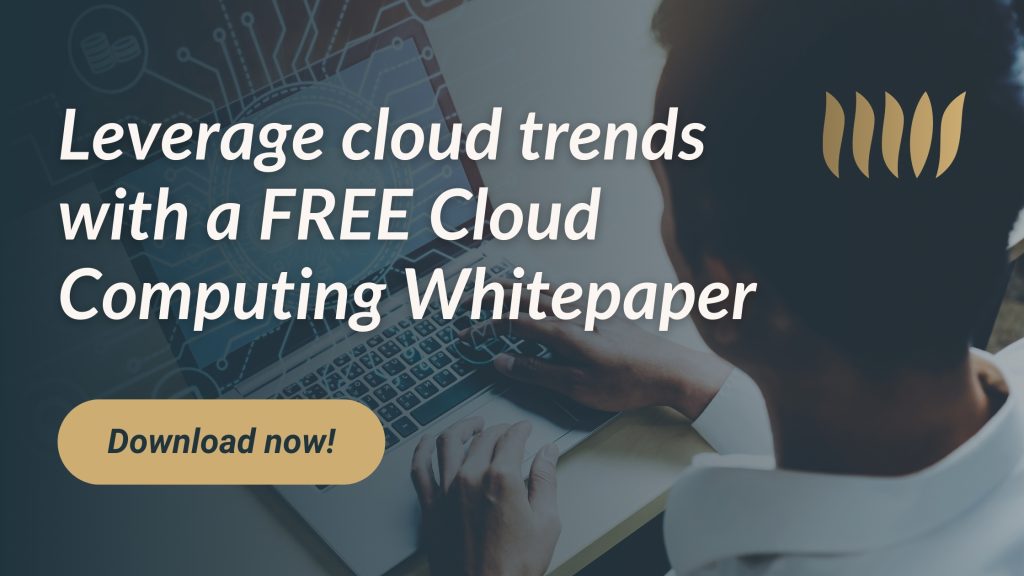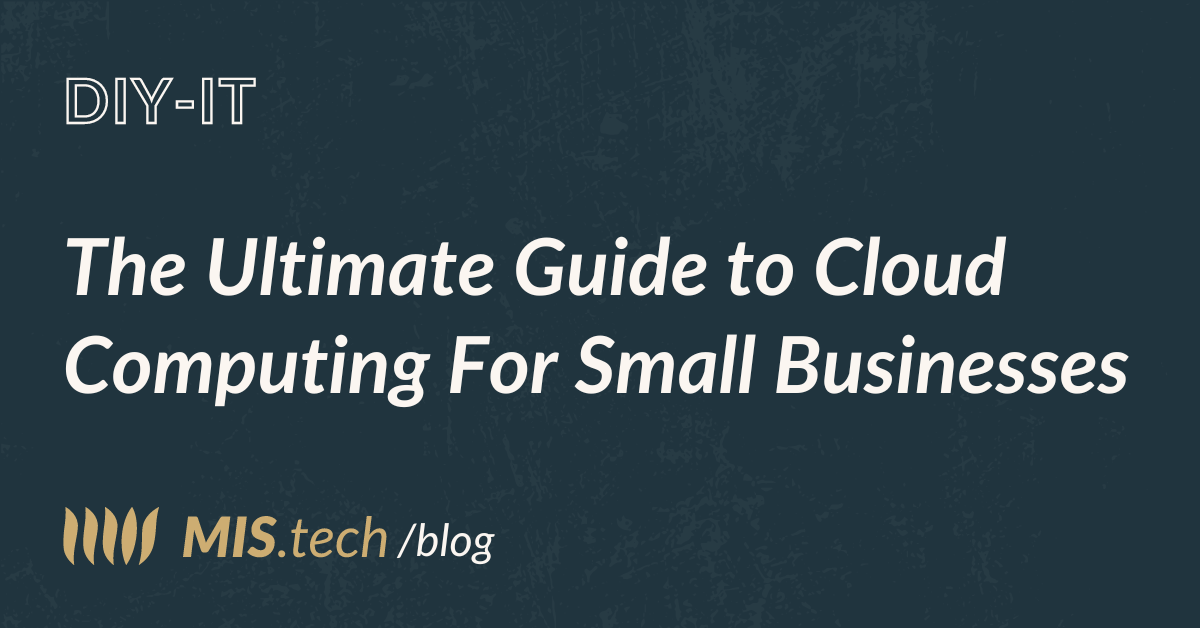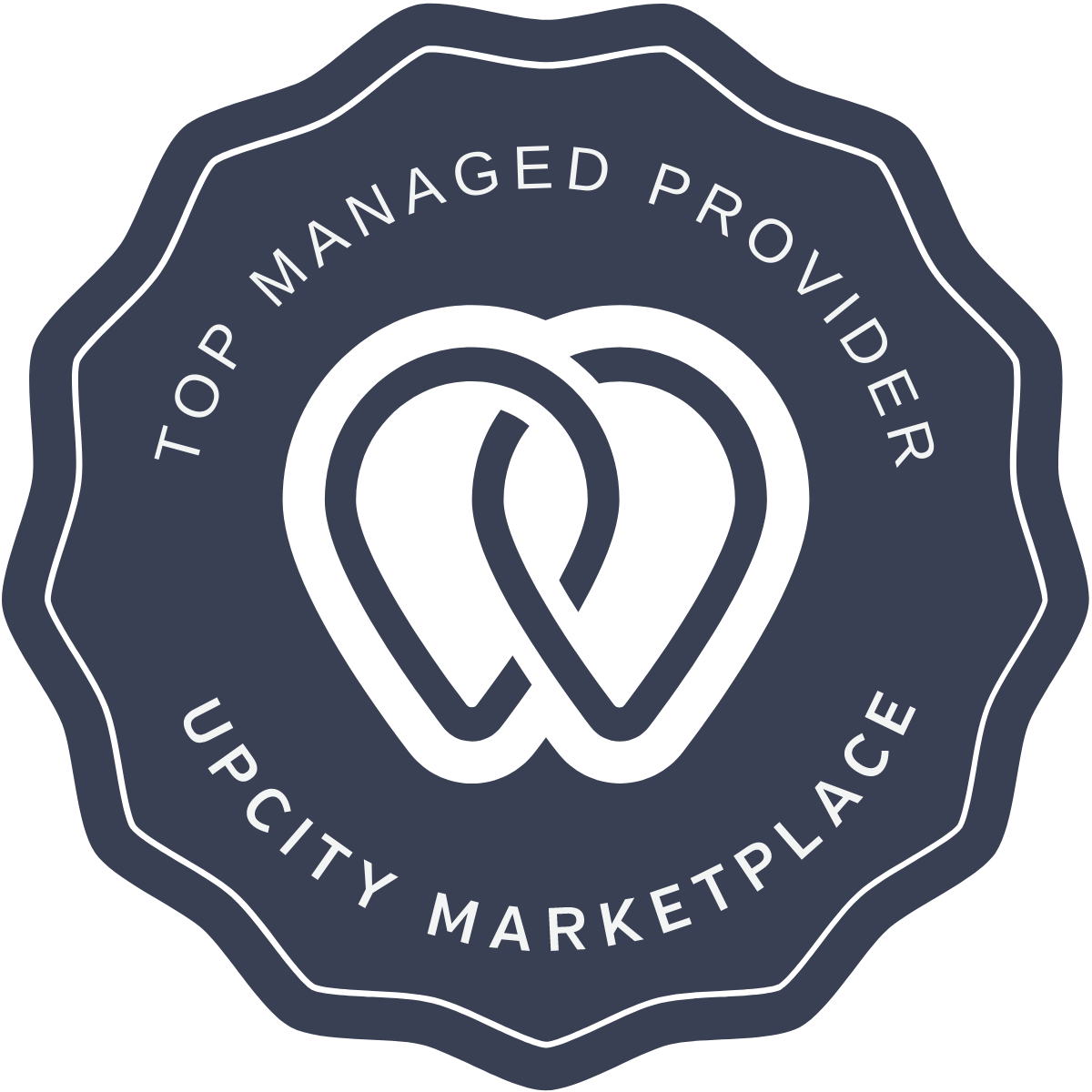Cloud computing has been one of the biggest changes in IT history.
We went from businesses having dedicated server rooms on-premise to moving everything to the cloud.
It’s been an absolute game changer for small and large businesses alike as it directly affects cost saving, scalability, reliability, and many other benefits.
To put this into perspective, one of our partners had 32 physical servers, which went down to 3, and now we’re getting rid of those 3 as well.
All thanks to cloud computing.
In a nutshell, cloud computing is on-demand delivery of IT resources over the internet instead of buying, owning, and maintaining physical data centers and servers.
And below, we’ll cover everything you need to know about the cloud.
- The secret to scaling as a small business: How to grow your operations without skipping a beat from the IT side thanks to cloud computing.
- On-premise servers vs cloud computing: Why the cloud will be better for your business 99% of the case.
- An overview of the many benefits the cloud offers: How to save money, streamline operations, and work from anywhere.
- Who is the cloud ideal for? What you need to know if you have under 50 employees.
- How much you save with the cloud, when to consider the ‘hybrid’ option, and where to go next.
PS – looking to grow your business via the cloud? Begin your cloud journey with a free consultation and see our cloud services for more info.
Intro To The Cloud: What Is Cloud Computing And How Does It Work? (With Examples)
COVID made a lot of business owners realize the importance of convenience.
They realized they were dependent on physical, on-premise servers.
Because they suddenly had to switch to working from home, they didn’t miss a beat when work was concerned thanks to the cloud.
That’s because everything they needed became available online and they were able to access everything from their homes.
Through tools like SharePoint, OneDrive, Teams, and others – organizations can revolutionize their work environment and achieve new levels of efficiency.
Office 365, for example, offers seamless collaboration, advanced identity management, and real-time communications through Teams.
So, simply put, “the cloud” refers to servers you can access over the internet and the software and databases that run those servers.
And the beauty of the cloud means that users can access the same files and applications from almost any device, because the computing and storage take place on servers in a data center.
Generally speaking, if you have under 50-75 employees as small business, you probably don’t even need any IT on-premise anymore nowadays.
When talking with our partners, if we notice their servers are getting old, before, our process was to replace them with something new.
Nowadays, in most cases, we can simply get rid of the physical server and move on.
This is huge for small businesses.
The cloud has simply revolutionized the concept of operational agility, allowing businesses to respond to market changes, expand or contract as needed, and remain competitive, for considerably less costs.
Speaking of, let’s take a look at some of the many benefits of the cloud you gain as a small business.
What are the benefits of cloud computing for small businesses?

With cloud computing, you can access computing services, applications, data storage and processing and more over the internet.
When it comes to cloud computing, typically, you’ll be on a pay-as-you-go basis, which might end up cheaper for you in the long run as well.
Considering the fact that Microsoft 365 (as an example) only starts at $6 per user, it’s going to be more than worth it. Especially when compared to the old way of doing things.
On-premise servers start at $1,000, and that doesn’t take into consideration server maintenance costs, user support, offsite backup, and more.
Of course, this is just the tip of the iceberg for small businesses when it comes to cloud computing benefits.
Other benefits of cloud computing also include:
- Data accessibility. With cloud computing, you can access information anywhere as long as you have internet connection. Instead of storing data in your computer or at the office server, everything is online with instant access.
- Consistency between users. When multiple people are working on the same file, it’s to make mistakes with consistency. Thanks to the cloud though, everything is automatically synced across all devices. So, this way, users can access the latest version of any file and even work on it together.
- Makes scaling easier. As your business grows, so will your IT needs and operations infrastructure. You’ll need more people using your applications to collaborate with other employees. With the cloud, you can continue your scaling operations without missing a beat.
- Disaster recovery. In the past, any emergency or severe failure could lead to catastrophic data loss. With cloud computing, disaster recovery is simplified and stress-free. Cloud providers employ robust data backup and redundancy measures, ensuring your data remains safe and retrievable in case of unexpected incidents.
In a nutshell, cloud computing lowers people’s power footprint in office spaces. Which then facilitates more flexible operations.
At times, when small businesses transition to the cloud, they might encounter connectivity and speed challenges.
However, the cloud’s scalability, cost-effectiveness, and resource optimization offered by the cloud changes how businesses operate and manage their IT infrastructure.
With most of our partners now, if we’re not running servers on-site, we’re running dual internet (2 separate internet service providers).
This setup allows for a failover mechanism (to automatically switch to a backup option in case the primary system fails). By having a dual internet connection, businesses can essentially eliminate most uninterrupted access to the internet and critical cloud services, even if one of the ISPs (internet service providers) encounters problems.
Overall, in almost the majority of cases, cloud computing will run better than it would on-premise.
It will run into much fewer issues while also allowing for bigger flexibility for workers.
Is The Cloud Secure For Small Businesses?
This is a common question among small business owners. And there’s some validity to it.
Before, if someone wanted to hack you, they’d have to find you first.
Now, your data, along with everyone else’s, is together on the cloud.
While there are still virtual firewalls up and businesses are following best cybersecurity practices, no one is 100% safe.
However, if the Microsoft data center got hacked, then there are bigger issues to worry about.
On its own, the security features that come with cloud computing are much stronger than anything that’s going to be on-premise.
Under cloud services, there are 3 main types you need to know about:
- IaaS – Infrastructure as a service. This enables you to “rent” an IT infrastructure from a cloud provider, such as servers, virtual machines, backup, and networks, on a pay-as-you-go basis.
- PaaS – Platform as a service. This enables cloud-based tools such as APIs (application programming interface), gateway software, and web portals to software developers.
- SaaS – Software as a service. Provides users with online access to software that can be accessed through a mobile, desktop or laptop client, and more. Examples of SaaS include Microsoft Office 365, Google Workspace, and so on.
When it comes to infrastructure as a service, we typically recommend Microsoft Azure as an all-in-one IT infrastructure solution ecosystem.

Then, here’s how your data in the cloud works:
- It protects personal and sensitive data stored on the cloud through encryption.
- Cloud security then ensures businesses are compliant with data regulations.
- It ensures resources are accessible and safeguarded against any disruptions. From the business side, employees are following best cybersecurity safety practices (2-factor authentication, firewalls, updated operating systems, so on.).
- And finally, it can help you maintain trust with your customers.
Thus, the data you save with cloud service providers is typically much safer than information stored in your computer’s hard drive.
Cloud Usability: Streamlining Operations And Resource Management
By moving your infrastructure to the cloud, you’re using cloud operations to your advantage to grow your business.
One big advantage it offers within your operations is that less power is required overall.
For example, you don’t need a top-of-the-line laptop to run tons of apps and work properly.
Even with a less powerful machine, with 8 gigs of RAM instead of 16 for example, you simply open your web browser and work from there.
This is especially useful for small businesses that mainly use MS Word, Excel, and similar tools, which they can then just use online.
If you have under 50-75 employees, in most cases, you don’t even need any IT on-premise.
Using cloud computing to scale
This also ties in directly with scaling, as it provides so many convenience benefits,
As a small business, if you’re in the cloud, you can directly scale faster.
For example, let’s say you provide a service and you take on a new client. To help with fulfillment and execution, you also hire new employees.
From the IT infrastructure, you can hit the ground running as needed. With new IT needs to be met directly, such as:
- New phone extensions.
- New email addresses.
- Expanded storage capacity.
- Enhanced security measures.
- And more.
You also don’t have to worry about office space and there’s no delay.
One potential roadblock might be your employee headcount and the kind of data or files you manage.
While there are programs cloud content management software that offers unlimited storage, things can get pricy quickly.
Box, for example, offers around $25 per user for up to 15GB of storage. If you have 100 employees, the pricing can add up quickly ($2,500/mo in this case). Though there are different tools with different pricing models.
What is the hybrid option for cloud computing?
So, one other option to consider for your business is the hybrid option, which offers the best of both worlds – the flexibility of the cloud and the control of on-premise infrastructure.
This approach attempts to strike a balance tailored to specific business needs, and ensure optimal performance, scalability, and security.
Every business has unique needs and considerations.
A hybrid setup integrates on-premise resources with cloud services, offering a cohesive environment where workflow uses both local infrastructure and remote servers.
This synergy enables businesses to maintain critical operations on-site while harnessing the power of cloud scalability when necessary.
Choosing Your Path With Cloud Computing: Considerations and Benefits
The decision to adopt a hybrid cloud approach should not be taken lightly.
It hinges on a careful analysis of factors such as your existing IT landscape, data sensitivity, compliance obligations, and growth projections.
By blending in-house control with the cloud’s agility, your business can enjoy several advantages such as:
- Tailored performance.
- Enhanced security.
- Cost-effective scaling.
- Seamless disaster recovery.
- And more.
Wondering if the hybrid option is right for your business?
Or how to successfully migrate to cloud computing for your business, without skipping a beat?
The truth is, it’s hard to say outright as there are so many factors to consider.
So, why not begin your cloud journey today with a free consultation?
See how you can unleash the potential of cloud services for your business here!
We offer end-to-end migration and integration services for Microsoft 365, Azure, AWS, and Google Workspace. Employing proven methodologies to ensure smooth cloud transition with minimal disruption to your operations.
Our industry-specific expertise and competitive pricing make MIS Solutions the ideal partner for businesses looking to harness the power of the cloud.
Where To Go From Here
So, to recap:
- Can small businesses use cloud computing?
Yes, cloud computing is ideal for small businesses to access data and information from anywhere with an internet connection. If you have under 50-70 employees, in most cases, you don’t even need any IT on-premise and you can use everything from the cloud. Using cloud computing as a small business lessens the workload of your IT department and infrastructure, allowing for increased flexibility.
- What can cloud computing do for small business?
With cloud computing, there are a lot of advantages and benefits cloud computing offers for small businesses. Primarily, it revolutionizes the way they operate and work in today’s digital landscape. One of the main benefits it offers has to do with scalability and flexibility. As your business grows, so will your IT needs and infrastructure. With the cloud, you can continue your operations and bring in more people into your operations without skipping a beat.
- What is the average cost of cloud computing for small business?
While it depends on your requirements and IT needs, on average, a small business is likely to pay around $1,476 per month for an on-premise private cloud. Then, different SaaS (software as a service) tools depend on how many people will be using them. Microsoft 365 business standard, for example, starts at $12.50 per user.
Have specific questions on how cloud computing can help your business with its unique needs and requirements?


